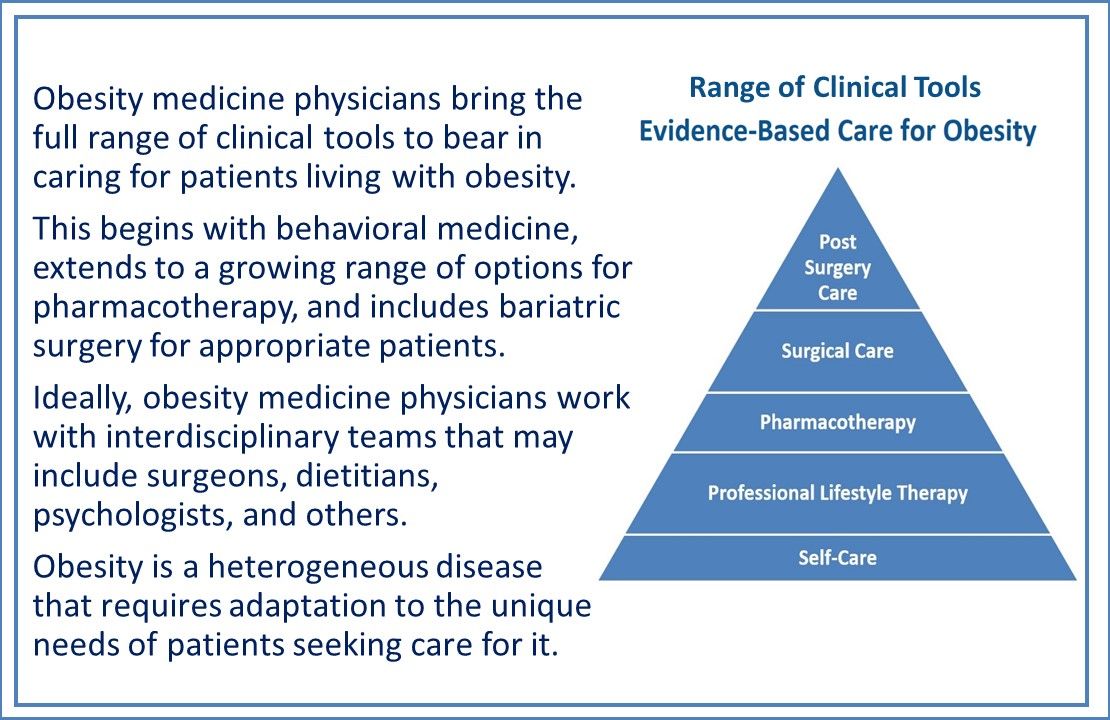- Clinical Technology
- Adult Immunization
- Hepatology
- Pediatric Immunization
- Screening
- Psychiatry
- Allergy
- Women's Health
- Cardiology
- Pediatrics
- Dermatology
- Endocrinology
- Pain Management
- Gastroenterology
- Infectious Disease
- Obesity Medicine
- Rheumatology
- Nephrology
- Neurology
- Pulmonology
Why is Obesity Medicine the Fastest Growing Medical Specialty in the US?
Obesity Medicine is a young specialty but is expanding quickly in response to the global epidemic of obesity and the many chronic diseases it causes.
A quiet revolution in obesity care is unfolding.
Years ago, the standard approach to obesity in primary care was to “instruct the patient to lose weight.” That was it. But without intensive behavioral support, it was largely ineffective. In some practices, that is still the approach today. But right now, more and more primary care physicians are pursuing certification from the American Board of Obesity Medicine. In fact, diplomates of the American Board of Obesity Medicine represent the fastest growing medical specialty in the U.S.
A young specialty
Obesity Medicine is a young specialty, growing in response to the growing prevalence of obesity and the health problems that it brings. It began in 2011 with the first board exam. Only 378 physicians earned diplomate status that year. Now we have more than 3,600 diplomates in Obesity Medicine. A record number of candidates took the certification exam this year – more than a thousand. Thus, it is likely when results for this year’s exam come out, a total of over 4,000 of these specialists will have been certified.
In addition, the number of fellowship programs in Obesity Medicine is growing. Up from just a bare handful of programs a few years ago, the Obesity Medicine Fellowship Council now recognizes 14 fellowship programs in the U.S.
The vast majority of physicians who seek this certification come from primary care – Internal Medicine, Family Practice, Gynecology, and Pediatrics. These four specialties account for 74% of diplomates in Obesity Medicine.
Grounded in physiology of chronic disease
In 2013, the American Medical Association resolved that obesity is a complex, chronic disease requiring evidence-based medical treatment. The implications of this decision are still playing out. Back then, the most common view of obesity was that it is primarily a problem of behavior and choice. But today, we have a much deeper understanding of the physiology that drives obesity.
Hundreds of genetic markers drive an individual’s risk for obesity. The heritability of obesity is approximately 70% – an observation that has held up for decades. Genes set the table for an individual to be susceptible and the environment – food supply, built environment, endocrine disruptors, etc. – serves it up.
Obesity Medicine physicians have the training to treat obesity and deal with the unique physiology of this disease. Specialists in the field also have expertise in behavioral medicine and the psychosocial aspects of obesity. As much or more than in any other chronic disease, a patient-centered approach to obesity care is critical. (See Figure below, Evidence-based Care for Obesity)
The most recent data from CDC tell us that obesity prevalence is continuing to grow. At present, 42% of American adults have obesity. Significantly, the prevalence of severe obesity (BMI >40) is growing even faster, now amounting to 9.2% of the U.S. adult population.
Given these trends, the need for obesity medicine physicians will continue to grow for some time to come.

_________________________________________________________________________________
Ted Kyle is a pharmacist and health innovator living in Pittsburgh. He's also a tireless advocate for people living with obesity. His widely-read daily commentary, published at conscienhealth.org/news, reaches an audience of more than 15,000 thought leaders in health and obesity.
_________________________________________________________________________________
Obesity Linked to Faster Alzheimer Disease Progression in Longitudinal Blood Biomarker Analysis
December 2nd 2025Biomarker trajectories over 5 years in study participants with AD show steeper rises in pTau217, NfL, and amyloid burden among those with obesity, highlighting risk factor relevance.
